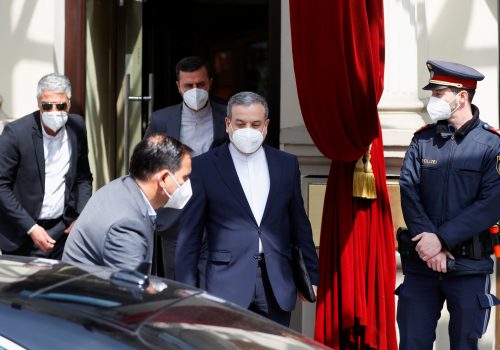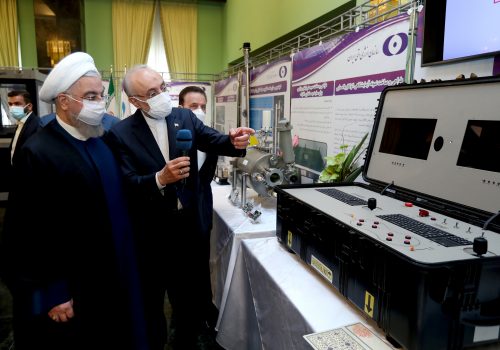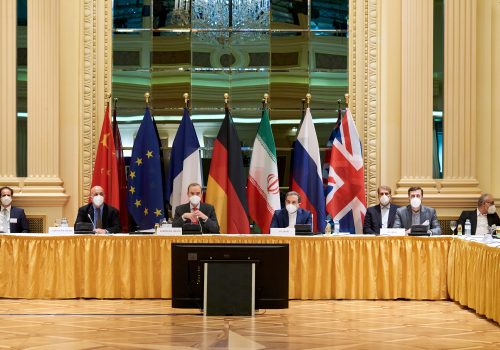Russia secretly feared the Iran nuclear deal. Here’s why.
The leaked audiotape of remarks made by Iranian Foreign Minister Mohammad Javad Zarif did not just reveal friction within the Iranian political establishment over the nuclear accord, it also disclosed that Islamic Revolutionary Guard Corps (IRGC) Quds Force commander, Qasem Soleimani—who was killed in a US drone strike in Iraq in January 2020—collaborated with Russia “to sabotage the nuclear deal.” According to Zarif, “Russia did not want the agreement to succeed… because it was not in Moscow’s interests for Iran to normalize relations with the West.” He said that Soleimani even traveled to Moscow in an attempt to undermine it.
This leak is consistent with reporting in 2015 that Moscow was very nervous that the Joint Comprehensive Plan of Action (JCPOA) would negatively affect Russia. One concern was that the agreement would lead to a broader US-Iran rapprochement that would marginalize Russia and even undermine its role as a great power. This may not have been a possibility that Western analysts even considered, but it is one that Russian analysts seriously anticipated. Moreover, with economic sanctions lifted on Tehran, Russian observers feared that increased Iranian petroleum exports would lower oil and natural gas prices, thus reducing the petroleum export income on which Moscow heavily depends.
In private conversations with Russian observers at the time the JCPOA was being negotiated, I was told that, if a more general US-Iran detente occurred, Tehran might withdraw its forces from Syria and leave Russia to defend the Bashar al-Assad regime on its own. This was something Moscow especially did not want to see happen right when its own intervention in Syria was in planning and then beginning in 2015. Furthermore, I was told that Tehran might agree to a peace settlement for Syria that left no role for Moscow. Russian analysts also feared that Iran would have little need for Russia as its economic ties would be primarily with the West and China. Indeed, a US-Iran rapprochement seemed to be a far more dire scenario for Russian observers than the prospect of a nuclear-armed Iran.
However, if the Iran nuclear deal was viewed so fearfully in Russia, why did Moscow agree to the JCPOA? In 2015, Russian Deputy Foreign Minister Sergei Ryabkov reportedly told critics of the deal within the Russian foreign ministry that the JCPOA would have been achieved whether Moscow participated in the talks or not. In other words, Moscow supported the agreement because Tehran wanted it. So, it would have been counterproductive for Russia to have opposed it.
With the prospect of US-Iran rapprochement being seen as a worst-case scenario by Moscow, the Kremlin was pleased with the US withdrawal from the agreement in 2018 under President Donald Trump. Moscow would have been uneasy, though, if it knew about Trump’s hopes to reach some sort of overarching agreement with Iran, as his former National Security Advisor, John Bolton, described with disgust in his 2020 memoir, The Room Where It Happened.
While Moscow now outwardly supports the revival of the JCPOA being pursued by the Joe Biden administration, the Russian logic of improved US-Iran relations being bad for Moscow suggests that the Kremlin will not be sad if this effort fails. Even if the US and Iran do find common ground over the JCPOA, Moscow no longer needs to fear that it will lead to a broader US-Iran detente as there are too many other issues that Washington and Tehran disagree over. Indeed, Moscow has an interest in Iran remaining militarily involved in Syria not simply to share the burden of defending the Assad regime there, but also because it prevents US-Iran relations from improving as Moscow has long feared they might.
What all this says is that the Biden administration can expect no significant help from Moscow on reviving the nuclear accord, persuading Iran to end its involvement in Syria and other regional conflicts, or ameliorating relations between Iran and the US and its Middle Eastern allies. But, if Moscow benefits—or thinks it does—from the continuation of US-Iran hostility, the Biden administration’s desire to thwart Russian ambitions should serve as an incentive to not only revive the JCPOA but to reduce tensions between Washington and Tehran more broadly.
Mark N. Katz is a nonresident senior fellow at the Atlantic Council. He is also a professor of government and politics at the George Mason University Schar School of Policy and Government.
Image: Iran's Foreign Minister Mohammad Javad Zarif and Russia's Foreign Minister Sergey Lavrov sign an agreement in Tehran, Iran, April 13, 2021. Iran's Foreign Ministry/WANA (West Asia News Agency)/Handout via REUTERS ATTENTION EDITORS - THIS IMAGE HAS BEEN SUPPLIED BY A THIRD PARTY.


